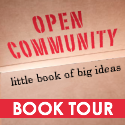I’m taking part in the virtual book tour Maddie Grant and Lindy Dreyer are doing to explore concepts from Open Community: a little book of big ideas for associations navigating the social web. In this post, Maddie and Lindy answer a few questions for anyone interested in the “new PR” or PR 2.0. 
Why did you write Open Community?
Maddie: Lindy and I have talked to thousands of association executives who have voiced their frustrations about the social web–from the overabundance of tools and the disorderly experimentation of staff (and members!), to the lack of organizational support and the unwieldy processes for monitoring and managing social media, and that’s just the beginning. We decided to write Open Community as a way to address those frustrations and redirect the thinking about using social tools to build community online.
So, what is “Open Community?”
Lindy: Here’s the gist. Your Open Community is your people who are bonded by what your organization represents and care enough to talk to each other (hopefully about you!) online. Connecting with and supporting your Open Community is really important, because if you don’t, someone else will.
Why is Open Community important for public relations?
Maddie: I think PR professionals are pretty savvy to the usefulness of tools like Facebook, Twitter, and LinkedIn for raising awareness when the conditions are right. And the smartest PR agencies get that you have to have a relationship with your community if your PR or marketing messages have any chance of getting anywhere.
I was at Blogworld recently, listening to Todd Defren and Dave Fleet talk about how social media for PR has to be about building engagement year-round with people around your brand or organization – and I got up and asked them, “if that’s the case, why do we need PR agencies?” I was being tongue-in-cheek, of course, and they had some good answers (about how agencies can help you scale, and can help you in times when crisis communications are necessary) – but the bottom line is, it’s VERY important for anyone in PR, whether internally or externally, to understand the messy dynamics of the Open Community around organizations.
Lindy: Yep, exactly – moving forward, the concept of Open Community challenges PR pros to work more collaboratively across the organization and empower more people to share more valuable information more often. Clarity over control–our way of describing a scenario where everyone knows the mission and strategic objectives of the organization and their role in achieving those objectives–is becoming more and more crucial for success. It’s not something traditional PR departments (or agencies) are comfortable with; they’re used to controlling the message and the distribution channels. That’s just not realistic anymore. Nor is it scalable to the Open Community. It’s like PR pros have to switch from being the star quarterback on the offense to being the free safety on defense. It’s a different mindset.
Maddie: Football analogies?
Lindy: You can do a soccer analogy next time. ![]()
What’s next?
Maddie: Well, we see the book as a conversation starter–we hope lots and lots of people will get the chance to read it, and think about how the concepts affect their organization.
Lindy: And we hope to gather lots of great stories about Open Community in action, which we’ll continue to share in lots of ways throughout the year. So here’s a question for all of you to consider…
How is your organization building community online – and what’s the role of PR in that? What are your PR challenges when connecting with and supporting your Open Community?
Check out their toolkit here.




